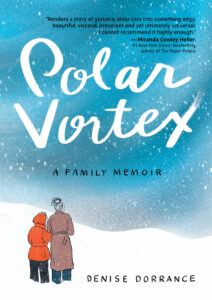As this graphic memoir opens, Denise Dorrance is a cartoonist living with her husband and son in London. Originally from Cedar Rapids, Iowa, she calls her 91 year-old mom every day just to check in. Mom has been living alone in their hometown since the death of her husband five years prior. When Mom doesn’t pick up one day, a concerned Denise has a home assistant go into the house to discover that Mom has, indeed, had a fall and needs to be admitted to hospital.
 Denise immediately flies out to Iowa, intending to stay for only one week. But the nightmarescape of trying to find a place good enough to take care of her mother is disorienting, and Denise soon finds herself extending her stay week after week as she attempts to navigate the different and bewildering health, insurance and payment options given to her. Add to this her strained relationship with her younger sister on the West Coast, and the impending polar vortex descending on her childhood home, and she’s lost in an emotional spiral even as she tries to be strong for a woman whose mind is clearly slipping.
Denise immediately flies out to Iowa, intending to stay for only one week. But the nightmarescape of trying to find a place good enough to take care of her mother is disorienting, and Denise soon finds herself extending her stay week after week as she attempts to navigate the different and bewildering health, insurance and payment options given to her. Add to this her strained relationship with her younger sister on the West Coast, and the impending polar vortex descending on her childhood home, and she’s lost in an emotional spiral even as she tries to be strong for a woman whose mind is clearly slipping.
The art in this graphic memoir is perhaps unsurprisingly excellent. While the linework is overall cartoony, in keeping with the author’s usual trade, the use of color to highlight emotion and detail, with the occasional fanciful excursion as Denise allows her imagination to run riot, is outstanding. It really makes the story feel more immediate, intimate and accessible.
I also really loved the rightful excoriation of the American insurance industry as profit-seeking mercenaries who dole out earned benefits stingily at best. I’m not entirely sure how much I agree with the difficulty of bringing an elderly parent to the UK, tho with the current political landscape and the author’s obvious reluctance to provide daily care for her mom, I can certainly see where the prospect would seem daunting.
What I genuinely did not fathom was why the author was being so self-centered when it came to her sister offering to take their mother in. There’s a certain streak of egotism inherent in any autobiography, and I absolutely sympathized with how difficult it is to acquire a new dependent, particularly in the face of extreme weather conditions. Maybe my confusion is just an Asian thing. My grandmother developed dementia as she aged, and my family accepted it as part of the natural process, taking turns to make sure she was properly taken care of in her own home. That said, my co-parent is white, and his family has also dealt very well with elderly relatives requiring memory care. Idk. I just found myself irritated by the blatant calls for pity, as the narrator occasionally made her mom’s issues more about herself than the person who actually needs care. Sympathy I can give, but there were points where I wanted to tell her to grow up already. Get over yourself and let your sister do the right thing. At no point did I think that anything but pride was preventing her from fixing her relationship with her sister enough to make it easier for them both to care for their mom.
Maybe I’m biased because taking care of our parents has been something my siblings and I have openly discussed since our teens. It baffles me that certain demographics just don’t think about it, much less talk about what to do when the inevitable occurs. Aging and decline are natural parts of life, and I genuinely don’t understand why so many people act like these are taboo subjects. Hopefully, books like Polar Vortex will encourage more people to have these very important conversations, as American social nets in particular continue to fail those who need them the most.
Polar Vortex: A Family Memoir by Denise Dorrance was published yesterday March 5 2024 by The Experiment, and is available from all good booksellers, including
